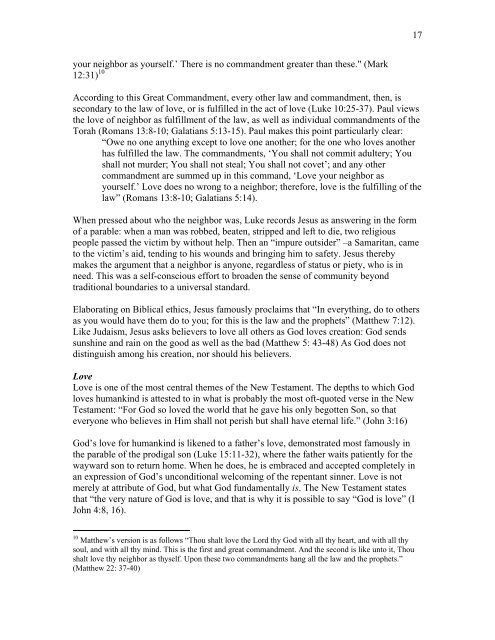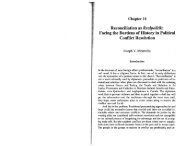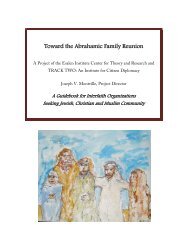The Ethics and Pro-Social Values in Judaism, Christianity and Islam ...
The Ethics and Pro-Social Values in Judaism, Christianity and Islam ...
The Ethics and Pro-Social Values in Judaism, Christianity and Islam ...
Create successful ePaper yourself
Turn your PDF publications into a flip-book with our unique Google optimized e-Paper software.
17<br />
your neighbor as yourself.’ <strong>The</strong>re is no comm<strong>and</strong>ment greater than these." (Mark<br />
12:31) 10<br />
Accord<strong>in</strong>g to this Great Comm<strong>and</strong>ment, every other law <strong>and</strong> comm<strong>and</strong>ment, then, is<br />
secondary to the law of love, or is fulfilled <strong>in</strong> the act of love (Luke 10:25-37). Paul views<br />
the love of neighbor as fulfillment of the law, as well as <strong>in</strong>dividual comm<strong>and</strong>ments of the<br />
Torah (Romans 13:8-10; Galatians 5:13-15). Paul makes this po<strong>in</strong>t particularly clear:<br />
“Owe no one anyth<strong>in</strong>g except to love one another; for the one who loves another<br />
has fulfilled the law. <strong>The</strong> comm<strong>and</strong>ments, ‘You shall not commit adultery; You<br />
shall not murder; You shall not steal; You shall not covet’; <strong>and</strong> any other<br />
comm<strong>and</strong>ment are summed up <strong>in</strong> this comm<strong>and</strong>, ‘Love your neighbor as<br />
yourself.’ Love does no wrong to a neighbor; therefore, love is the fulfill<strong>in</strong>g of the<br />
law” (Romans 13:8-10; Galatians 5:14).<br />
When pressed about who the neighbor was, Luke records Jesus as answer<strong>in</strong>g <strong>in</strong> the form<br />
of a parable: when a man was robbed, beaten, stripped <strong>and</strong> left to die, two religious<br />
people passed the victim by without help. <strong>The</strong>n an “impure outsider” –a Samaritan, came<br />
to the victim’s aid, tend<strong>in</strong>g to his wounds <strong>and</strong> br<strong>in</strong>g<strong>in</strong>g him to safety. Jesus thereby<br />
makes the argument that a neighbor is anyone, regardless of status or piety, who is <strong>in</strong><br />
need. This was a self-conscious effort to broaden the sense of community beyond<br />
traditional boundaries to a universal st<strong>and</strong>ard.<br />
Elaborat<strong>in</strong>g on Biblical ethics, Jesus famously proclaims that “In everyth<strong>in</strong>g, do to others<br />
as you would have them do to you; for this is the law <strong>and</strong> the prophets” (Matthew 7:12).<br />
Like <strong>Judaism</strong>, Jesus asks believers to love all others as God loves creation: God sends<br />
sunsh<strong>in</strong>e <strong>and</strong> ra<strong>in</strong> on the good as well as the bad (Matthew 5: 43-48) As God does not<br />
dist<strong>in</strong>guish among his creation, nor should his believers.<br />
Love<br />
Love is one of the most central themes of the New Testament. <strong>The</strong> depths to which God<br />
loves humank<strong>in</strong>d is attested to <strong>in</strong> what is probably the most oft-quoted verse <strong>in</strong> the New<br />
Testament: “For God so loved the world that he gave his only begotten Son, so that<br />
everyone who believes <strong>in</strong> Him shall not perish but shall have eternal life.” (John 3:16)<br />
God’s love for humank<strong>in</strong>d is likened to a father’s love, demonstrated most famously <strong>in</strong><br />
the parable of the prodigal son (Luke 15:11-32), where the father waits patiently for the<br />
wayward son to return home. When he does, he is embraced <strong>and</strong> accepted completely <strong>in</strong><br />
an expression of God’s unconditional welcom<strong>in</strong>g of the repentant s<strong>in</strong>ner. Love is not<br />
merely at attribute of God, but what God fundamentally is. <strong>The</strong> New Testament states<br />
that “the very nature of God is love, <strong>and</strong> that is why it is possible to say “God is love” (I<br />
John 4:8, 16).<br />
10 Matthew’s version is as follows “Thou shalt love the Lord thy God with all thy heart, <strong>and</strong> with all thy<br />
soul, <strong>and</strong> with all thy m<strong>in</strong>d. This is the first <strong>and</strong> great comm<strong>and</strong>ment. And the second is like unto it, Thou<br />
shalt love thy neighbor as thyself. Upon these two comm<strong>and</strong>ments hang all the law <strong>and</strong> the prophets.”<br />
(Matthew 22: 37-40)




